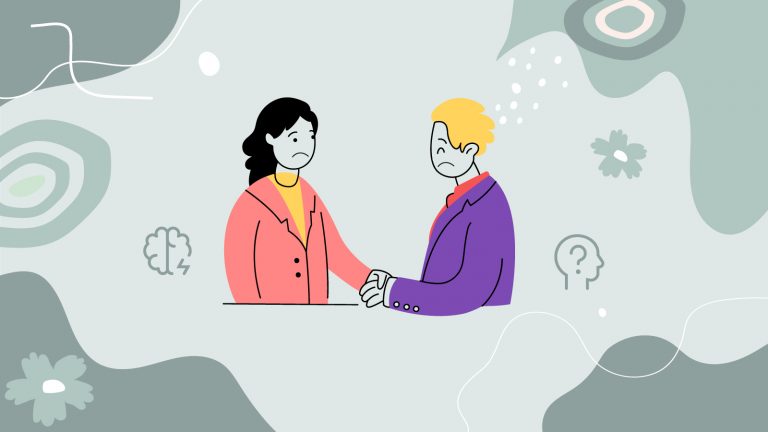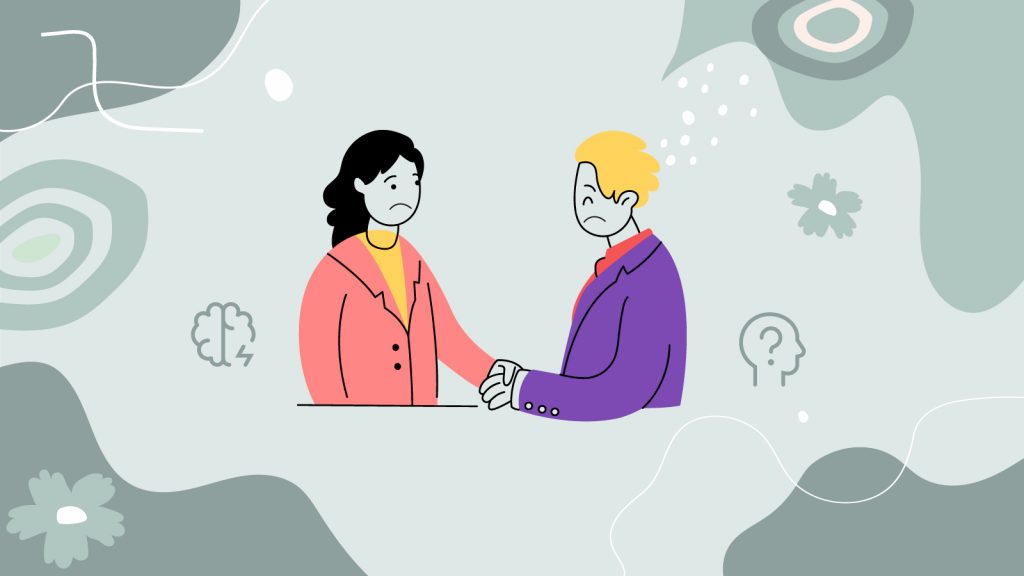“Lost the touch of emotions that once were flowing like the wind; silent feelings, like a sand, slipped through the hand.”
One of your close friends comes to you with his troubles, and you understand his situation but fail to express and connect deeply?
You might have been in the same situation when you are trying to share all your burdens with someone close to you, and that person fails to connect with you by heart, making you feel less valued.
This shows how important it is to be empathetic and show that you care and are there for your loved ones in need. It not only encourages them to stay strong but also ensures that you are there for them.
Let’s learn more about how being empathetic matters and what the effective ways to develop it are.
What Does It Mean to Be Truly Empathetic?
Have you ever wondered why people around you keep saying how empathy has moved them and how they can cope better with the empathetic people around them?
If you truly desire to understand empathy and how to become empathetic, you must know that it is not just about acknowledging someone’s feelings but also feeling them.
When you are finally able to fit yourself in someone else’s shoes and understand what they are actually experiencing, you are sharing the feeling of empathy. You will be able to connect deeply with them and walk with them emotionally, even if you are on an unfamiliar path.
You may think that when you are saying, “I know how you feel,” you are being empathetic. However, true empathy is beyond that; it is acknowledging that the emotions experienced by everyone are unique, even when they are in a similar situation.
Making this kind of connection allows you to offer your actual support without any judgment and creates a safe space for openness.
Empathy is neurological, not just an emotional experience. The mirror neurons in your brain activate when you witness someone else’s emotions or physical pain. It allows you to feel something similar to their experience.
👉 Pro Tip
Next time you listen to someone share their feelings, don’t just say, “I understand.” Instead, try to mirror their emotions in your tone and body language. This subtle shift deepens your empathetic connection and shows you’re truly tuned in.
It is an inherent part of human response, which you can improve like any other skill.
How Does Your Brain Connect with Others?
Your brain is naturally designed to understand and share the feelings of others.
Neuroimaging studies have shown that areas like the anterior cingulate cortex and the insula light up when you observe others in distress. These regions are linked to emotional and social processing, which create an inner map of emotions, making it easier to relate to others.
Oxytocin, the love hormone, plays an important role in enhancing your empathetic feelings. When your oxytocin levels rise, especially when you are trying to establish an emotional connection, your ability to empathize increases.
🎭 Fun Fact
Did you know that simply making eye contact with someone can trigger your brain’s empathy circuits? It’s a small gesture, but it releases oxytocin, making it easier for you to connect and share feelings with others.
Research shows that about 1 in 5 people struggle to understand why they feel stressed, anxious, or upset, which can make empathy even more challenging. But when you make a conscious effort to connect, your brain’s capacity for empathy strengthens over time.
Why Empathy Is Essential for Building Stronger Connections?
To better understand why empathy is essential for building a stronger connection, here are some of the key points to help you deepen your grasp:
- Empathy is the foundation of trust; it not only encourages open communication in both personal and professional relationships but also deepens the connection.
- If you are empathetic, people around you will feel seen, heard, and understood. It will help strengthen the emotional bond between you.
- According to a study done by Stanford University, teams that actively practice empathy are more productive and cohesive, demonstrating a positive impact on workplace dynamics.
- Empathy helps bond personal relationships, enabling emotional intimacy and allowing us to build deeper and more meaningful connections.
- When you are showing empathy, you make other people feel supported and understood, making it essential for resolving conflicts effectively.
- When you show empathy, you validate others’ emotions, making them feel supported and understood, which is crucial for resolving conflicts effectively.
- Empathy also reduces feelings of isolation, helping you easily understand emotionally complex situations, whether with a partner, colleague, or friend.
Bonus Point:
Empathy creates a ripple effect. When you show genuine empathy, it often inspires others to do the same, fostering a more compassionate and understanding environment in both personal and professional circles.
The above points will help you understand how important it is to be empathetic to build strong connections.
Practical Ways to Develop Empathy in Your Everyday Life
Being empathetic does not require you to show grand gestures; the small steps you take daily can lead you to build the deepest connections.
Here are some of the practical ways to develop empathy in your everyday life:
- Practice Active Listening
To begin with empathy, you must learn active listening, not just hearing the words. It involves truly paying attention to what someone is saying. Try putting your own thoughts and distractions aside when someone speaks to you next time. You have to focus on what they are saying and how they are saying it. Make your goal to listen with the intent to understand, not just to respond.
- Observe Non-Verbal Cues
There is a lot of non-verbal communication that you must learn to understand. If you are able to understand them, you can learn a large portion of someone’s emotional state through their body language, tone of voice, and facial expression. You can get a clearer picture of their inner experience, even if they are not able to express it.
- Use Empathetic Language
You can use phrases like “I can see that you are really upset” or “That must have been difficult for you” to confirm someone’s experience. Make sure you are not rushing to solve their problem but verbally acknowledging their feelings. It will help you deepen the conversations and provide emotional support.
- Ask Open-Ended Questions
Another great way to show empathy is by asking questions and encouraging other people to share their feelings and thoughts. You can ask, “How are you feeling about this situation?” instead of asking, “Are you okay?” It will help you show them your empathy and that you are interested in understanding their emotional position.
- Practice Empathy with Yourself
Before you start being empathetic with anyone else, you must practice empathy with yourself. You cannot truly empathize with others when you are not with yourself. You must take time to acknowledge your own emotions, especially those that are complex. Self-compassion will help you build a foundation to be more aligned with others. You can keep a journal and write positive affirmations to start practicing self-compassion.
Empathetic Question:
When was the last time you paused to truly listen to someone without thinking of how you would respond? How did it change the way you understood their emotions?
According to a survey by the American Psychological Association, nearly 40% of adults report feeling overwhelmed or anxious without understanding why. Practicing empathy with yourself first can help you better connect with others in a more genuine and grounded way.
Conclusion
Empathy is just like any other skill that you can improve with time. It is important to continuously try to understand the other’s perspective; it will eventually help you grow your relationship stronger and more fulfilling.
You can start by observing non-verbal signals, using empathetic language, or practicing active listening to bring you one step closer to building a connected world, which includes understanding and compassion.
Empathy not only helps others feel better but also improves your life too. Every time you are able to truly feel someone else’s emotional experience, you expand your own ability to love, compassion, and connection.
“Empathy making its way, riding in a wagon of hopes, making it easier to build a connection, walk you through the tides and slopes.”
🎭 Activity: The Empathy Walk
Next time you’re in a public place—a park, a café, or even a busy street—take a 5-minute “Empathy Walk.”
As you pass by people, try to imagine their stories. What might they be feeling at this moment? Why?
This simple exercise helps you practice stepping into someone else’s shoes, broadening your perspective, and enhancing your empathy in everyday life.





















